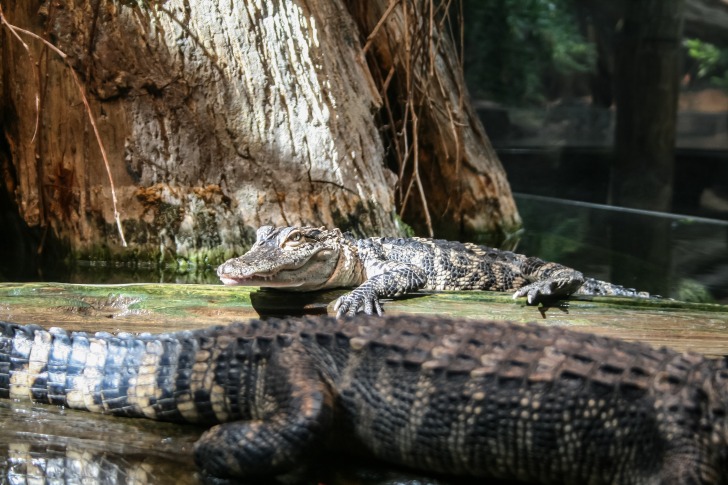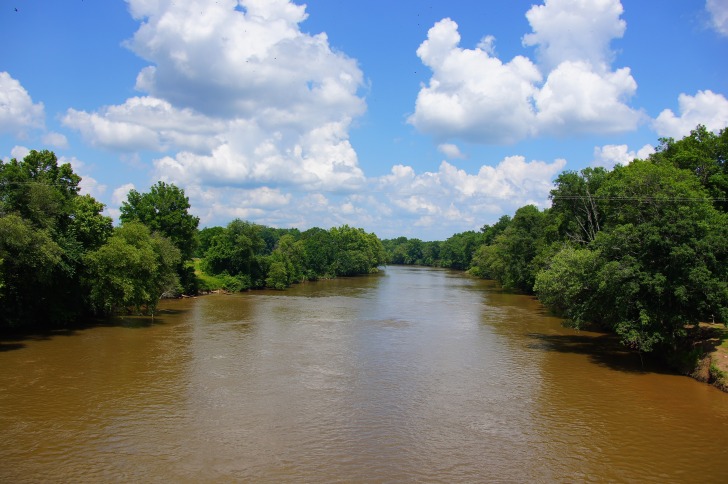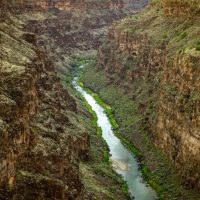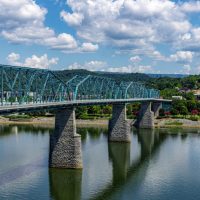Maybe you could spot an alligator swimming in the Chattahoochee, but it’s not a sure thing.
Tubing the ‘Hooch is a favorite pastime of people growing up in Northeast Georgia, where I’m from.
Helen, GA provides an Old Bavaria backdrop to a popular tubing attraction right there on the river banks where they start at the north.
By the time you get to the bottom of the Chattahoochee River, though, you will be clear down in Florida.
All around you are water moccasins, aka black snakes, that are big and scary but not venomous.
But do you have to watch out for alligators as well?
You should, due to the close proximity of the Okefenokee Swamp where thousands of alligators live in the wild.
Find out more about what kind of alligators are in the Chattahoochee, and what you should do if you are swimming in their backyard.

Contents
So… Are There Alligators in the Chattahoochee?
Yes, there are alligators that make their way up to the Chattahoochee River.
Britannica defines “Chattahoochee” to mean either pounding rock or cornmeal from the local Native American tribal languages.
The river itself flows from northeast Georgia into the foothills of the Blue Ridge Mountains, which are part of the Southern Appalachian Mountains.
About the Chattahoochee River
As a leading water source for the state of Georgia, the Chattahoochee continues down through Atlanta and into Florida.
The Chattahoochee River spills into Apalachicola Bay, which is where it becomes the Apalachicola River.
From here, the now-Apalachicola River drains into the Gulf of Mexico through the lands between Panama City Beach and Tallahassee, Florida.
The river powers Georgia, quite literally, through electricity generated by two dams on the river.
These dams include Buford Dam in Buford, GA on the northeastern side of Atlanta, as well as along Lake Lanier in Gainesville, also in the same vicinity.
For a river that flows for about 436 miles through one of the busiest cities in the Southeast, the Chattahoochee River is popular with tourists and water sports enthusiasts.
Several tubing, kayaking, rafting, and water slide businesses are maintained along the river, and trout fishing along with fly fishing are major affairs.
This makes having alligators in the river quite troublesome for tourists and water sports enthusiasts alike.
Meet the Okefenokee Swamp
The Chattahoochee is in close proximity to the Okefenokee Swamp and the Okefenokee National Wildlife Refuge and the Okefenokee Wilderness.
The swamp is home to 10,000 to 13,000 American alligators as their natural habitat.
Located in Southeast Georgia and Northern Florida, the swamp has an obvious connection to the Chattahoochee River.
However, the Chattahoochee River does not flow into the black water swamp.
The Okefenokee is fed by the Suwannee River, which flows into the Gulf of Mexico, the same as the Chattahoochee.
It is imaginable that American alligators living in the Okefenokee Swamp could travel along the Suwannee River into the Gulf of Mexico.
From here, the alligators could swim back up into the US through the Chattahoochee River.
Saltwater Changes the Situation
But this is not possible due to another reason.
Alligators can’t live in saltwater.
Therefore, the Gulf of Mexico, which is a saltwater habitat, is inaccessible to the American alligator.
The National Zoo of the Smithsonian explains how alligators can live in saltwater, but not for long.
Alligators lack salt glands, an organ found in saltwater species like sharks that excrete salt.
Salt glands would allow the gators to breathe in the saltwater.
American alligators can live in freshwater in swamps, such as blackwater that is sulfuric, as well as marshes, lakes, and rivers.
By understanding how alligators live in certain types of water, it is easier to see how these reptiles can travel along certain waterways.
As a result, alligators are not able to breed outside of these waters.
You can find alligators in the Suwannee River, though.
This is why some say that alligators could theoretically leave the Suwannee River and make it over west to the Chattahoochee River.
There are approximately 150 miles between these two river banks at Chattahoochee, FL, and the Suwannee River at O’Brien, FL.
Alligator Species in Chattahoochee
In the Chattahoochee River, there could potentially be an American alligator.
This is the most common alligator found in Georgia and Florida and the only known breed of a wild alligator in the region.
The Florida Everglades are another place where American alligators live, along with American crocodiles.
In fact, South Florida is the only place on the planet where American alligators and American crocodiles live together peacefully.
Is it Safe to Swim in Chattahoochee?
Yes, swimming in the Chattahoochee and the local lakes, including Lake Lanier, are major ways to cool off in the summertime in Georgia.
Finding somewhere along the river’s banks to jump in for a dip is not impossible as there are plenty of local fishing holes that are open to the public.
At Blue Rope in northeast Georgia on the way to Helen, you can walk down beneath the bridge to either put a kayak or canoe in the river or simply swim.
There are free places to go swimming in the Chattahoochee all throughout Georgia and Florida.
However, the river is most inviting for swimmers at the northern end near Helen, where the tourist industry is booming.
The local businesses have made it their business, quite literally, to provide the public with easy access to the Chattahoochee for recreational purposes.
The southern state is known for being a humid scorcher, and wading and swimming in the river is a lot of fun for locals and out-of-town tourists.
I would not recommend swimming in the Chattahoochee River before April due to the cold snowmelt coming from the Blue Ridge Mountains.

Interesting Alligator Facts in Chattahoochee
Alligators have been in south Georgia for centuries! According to the Chattahoochee Riverkeeper, “The American Alligator (Alligator mississippiensis) lives in the swamps, marshes, rivers, ponds, and lakes south of the Georgia fall line, which is the geological boundary that runs northeast across Georgia from Columbus to Augusta.”
So finding no alligators in the Chattahoochee River is actually a rare occasion.
Alligators vs. Crocodiles
There are both alligators and crocodiles in the Southeast of Georgia and Florida.
The prevalence of alligators in the blackwater swamp of Okefenokee is the primary reason we have alligators that could be in the Chattahoochee.
The American crocodile is another story.
Here you have a saltwater species of reptile that lives as far north as South Florida.
Saltwater breeders that they are, crocodiles simply cannot live in the Chattahoochee River at all.
So, if you see something reptilian swimming in the river, it must be a lost alligator.
Alligators are black, too, compared to the white coloration of a crocodile, which looks like it has been salted permanently by saltwater.
3 Safety Tips for Swimming in Alligator-infested Waters
- Avoid overgrown terrain around your swimming spot. If there are a lot of bushes and shrubs next to a waterway, stay out of there if you suspect alligators infesting the water. Alligators are more likely to hide in grassy places that are near the shores and banks of waterways. As a result, you could be swimming right in the front pool of an alligator nest and not be aware of their presence. Better yet, stick with concrete swimming holes, aka swimming pools, where you can clearly see the entire swimming area.
- Join up with someone to swim with a pal. Never swim alone in alligator-infested waters. If you are by yourself, there is a minimal chance you can fight off an alligator if it is attacking you. You certainly cannot run to seek medical aid if you are already being attacked.
- Wear a whistle. If you are concerned about your safety while swimming in a waterway that could be home to an alligator, take a lifeguard whistle. And make sure there is someone close enough to hear the whistle sound if you blow it! Otherwise, what would be the point?
Frequently Asked Questions
Can alligators breed with crocodiles in the Chattahoochee River?
Not at all.
The US Geological Survey (USGS) explains that alligators and crocodiles cannot breed because these two reptiles–even though they look exactly alike to many–are too genetically different. Isn’t that interesting?
Considering how donkeys and horses can breed, as well as many other near-species, it is curious that alligators and crocodiles are unable to do so according to the world of science and nature.
There will not be an “allidile” or a “crocogator” any time soon in the Chattahoochee River.
How could alligators travel to the Chattahoochee River?
If the alligator is provided with a means of transportation, such as in the back trailer of an unsuspecting truck driver, they could easily go 150 miles from the Suwannee to the Chattahoochee River.
That’s why it is possible you could see an alligator in the Chattahoochee, so keep your eyes peeled when you go tubing down the ‘Hooch this summer.
The Chattahoochee Riverkeeper reports alligators visiting the upper area of the Chattahoochee in northeast Georgia, as well as the region of the Chattahoochee in central Georgia.
These one-off sightings, though, are not from alligators traveling to seek more feeding or roaming ground.
Alligator males generally stay within a two-mile range, states the Smithsonian’s National Zoo and Conservation Biology Institute, and this is more than the females of the species.
The National Wildlife Federation (NWF) states that “American alligators can be found in the coastal wetlands of the U.S. Southeast, as far north as North Carolina and as far west as eastern Texas.”
Therefore, it is not as if these alligators cannot travel that far and survive.
An occasional alligator might be relocated to the Chattahoochee from a pet store or by escaping from a home habitat of a reptile owner.
However, the only way for an alligator to survive in the Chattahoochee River, it has to be able to reproduce.
American alligators can only reproduce in warm water.
The Chattahoochee River does have warmer waters down south of Columbus, GA.
However, there are very limited waterways in south Georgia on route to cross Florida into the Gulf of Mexico.
Additionally, alligators would not be able to live in the gulf’s salt water.
Therefore, there is a limited chance that any alligator would travel from the Okefenokee Swamp and the Suwannee River west to the Chattahoochee to start a “new family and life.”
Has anyone ever died from an alligator attack in the Chattahoochee?
To date, there have been no deaths from an alligator attack in the river.












It is important to be cautious when swimming in the Chattahoochee River due to the potential presence of alligators, but it is still a popular and enjoyable pastime for many in Northeast Georgia area.
Water moccasins are most definitely venomous